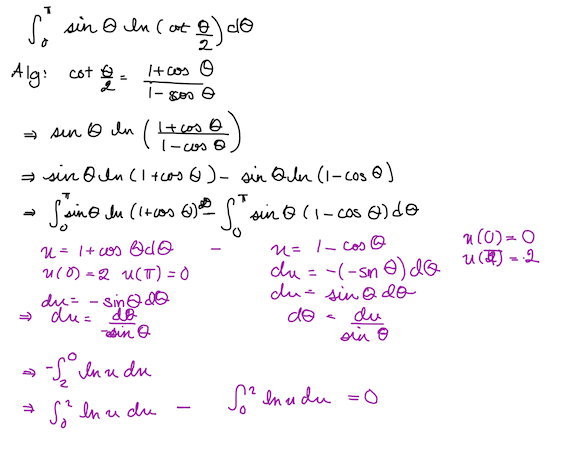By Parts Is Not Recommended
∫ 0 π sin x ⋅ ln ( cot 2 x ) d x = ?
The answer is 0.00.
This section requires Javascript.
You are seeing this because something didn't load right. We suggest you, (a) try
refreshing the page, (b) enabling javascript if it is disabled on your browser and,
finally, (c)
loading the
non-javascript version of this page
. We're sorry about the hassle.
4 solutions

the d theta is meant to be a du, and du is meant to be d theta for 1st piece of the problem as we're solving for d theta.
cot(x/2) = SQRT[(1+cos(x))/(1-cos(x)). You left out the square root. Due to the square root being inside the logarithm, it ends up multiplying the entirety of your solution by 1/2, and therefore doesn’t impact the outcome. Just something to watch out for in the future, when it may impact the solution.
First, make that arguments of the trigonometric functions identical to 2 x = y , replace cot y = sin y cos y , and distribute the logarithm: sin x ⋅ ln ( cot 2 x ) = 2 sin y cos y ln cos y − 2 sin y cos y ln sin y Using that sin y = cos ( π / 2 − y ) , and similarly cos y = sin ( π / 2 − y ) , this rewrites into = 2 sin y cos y ln cos y − 2 sin ( π / 2 − y ) cos ( π / 2 − y ) ln cos ( π / 2 − y ) Now, observe that y ranges from 0 to π / 2 , and that ∫ 0 2 π f ( y ) d y = ∫ 0 2 π f ( π / 2 − y ) d y . Thus, we find ∫ 0 2 π 2 sin y cos y ln cos y d y = ∫ 0 2 π 2 sin ( π / 2 − y ) cos ( π / 2 − y ) ln cos ( π / 2 − y ) d y Hence, we have ∫ 0 π sin x ⋅ ln ( cot 2 x ) d x = 0
The integrand is symmetrical respect to x = 2 π then the integral is 0.
Relevant wiki: Integration Tricks
Using the Identity : ∫ a b f ( x ) ⋅ d x = ∫ a b f ( a + b − x ) ⋅ d x I = ∫ 0 π sin x ⋅ ln ( cot 2 x ) ⋅ d x I = ∫ 0 π sin ( π − x ) ⋅ ln ( cot 2 π − x ) ⋅ d x Add the two integrals 2 I = ∫ 0 π sin x ⋅ ln 1 ⋅ d x I = 0